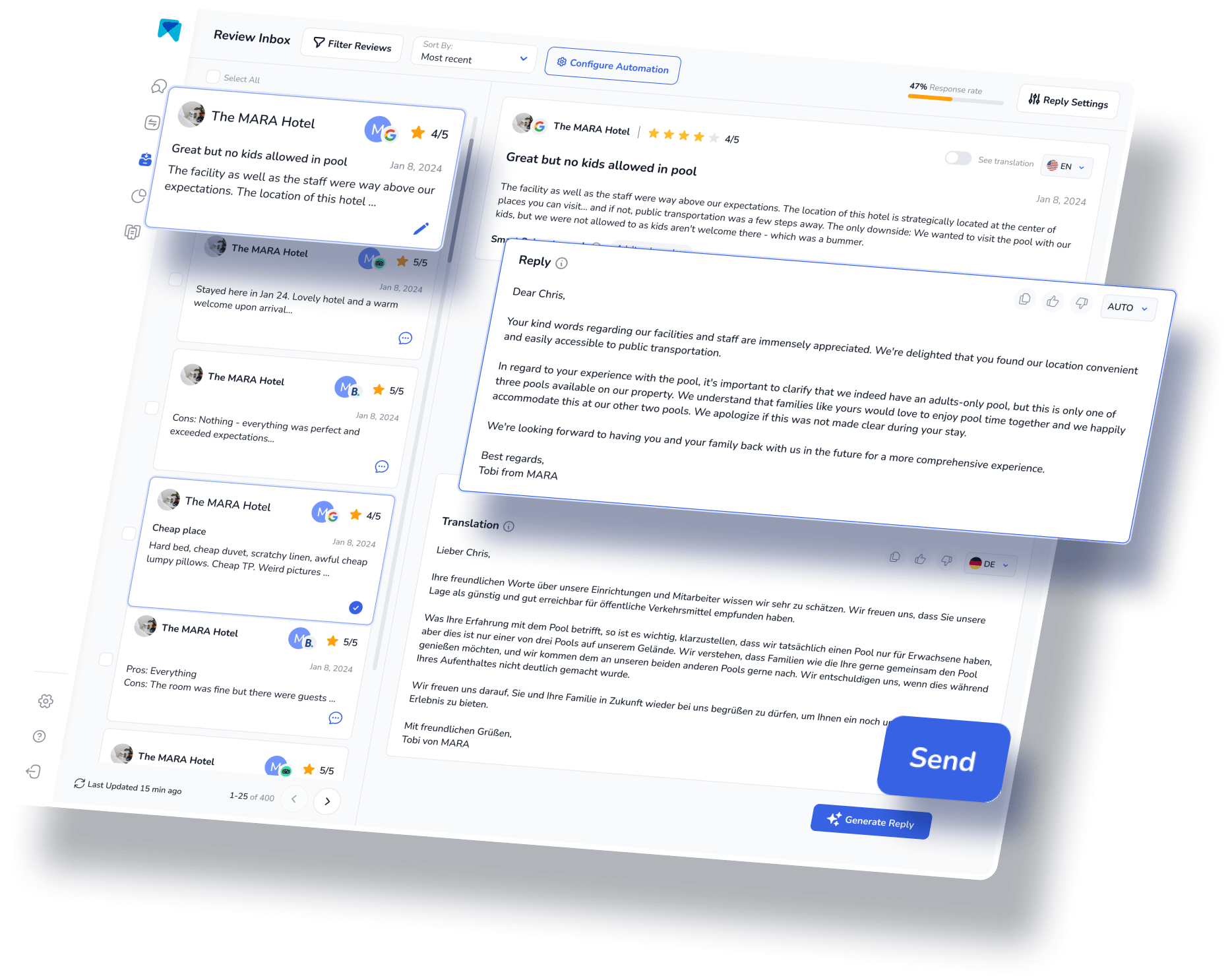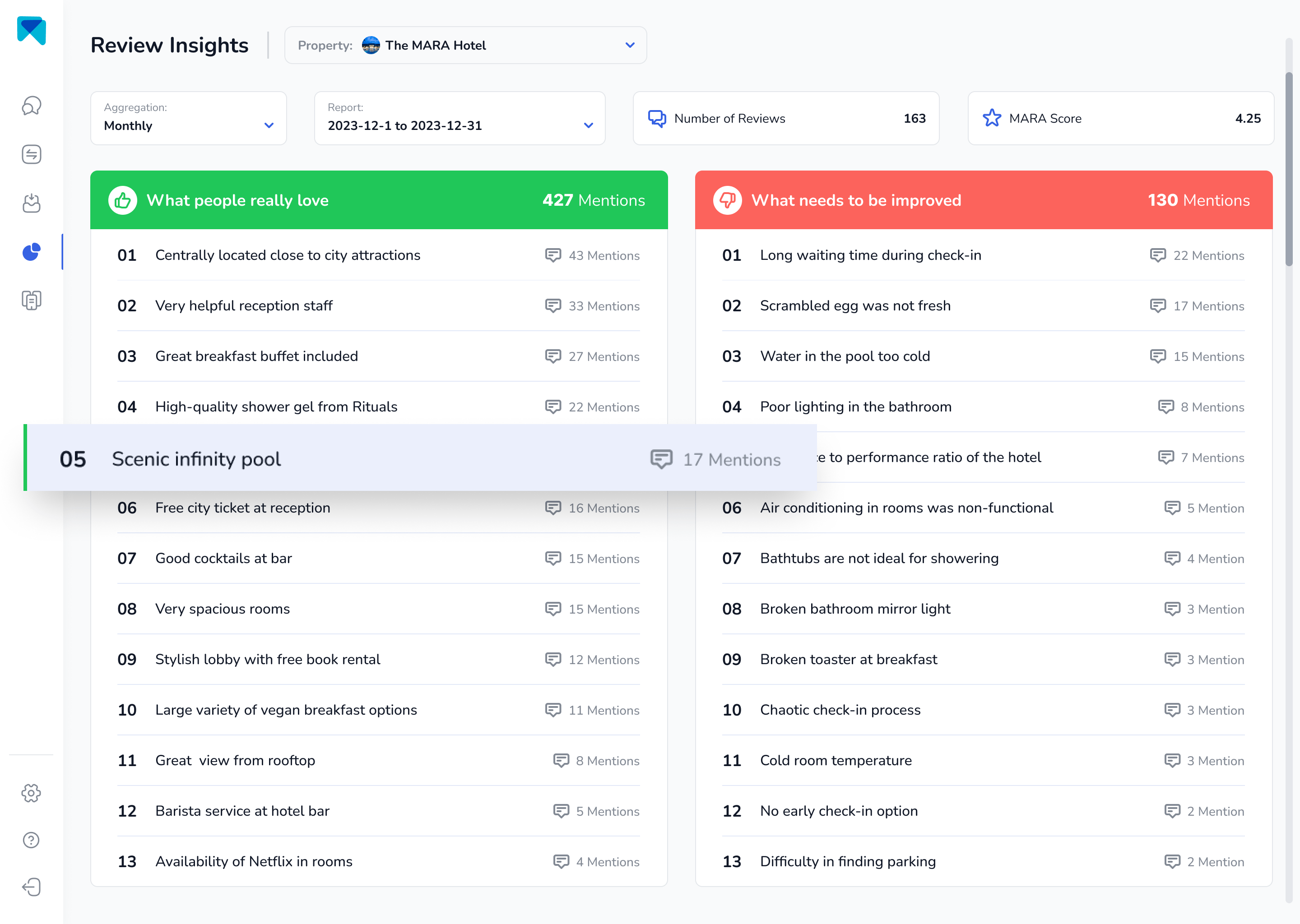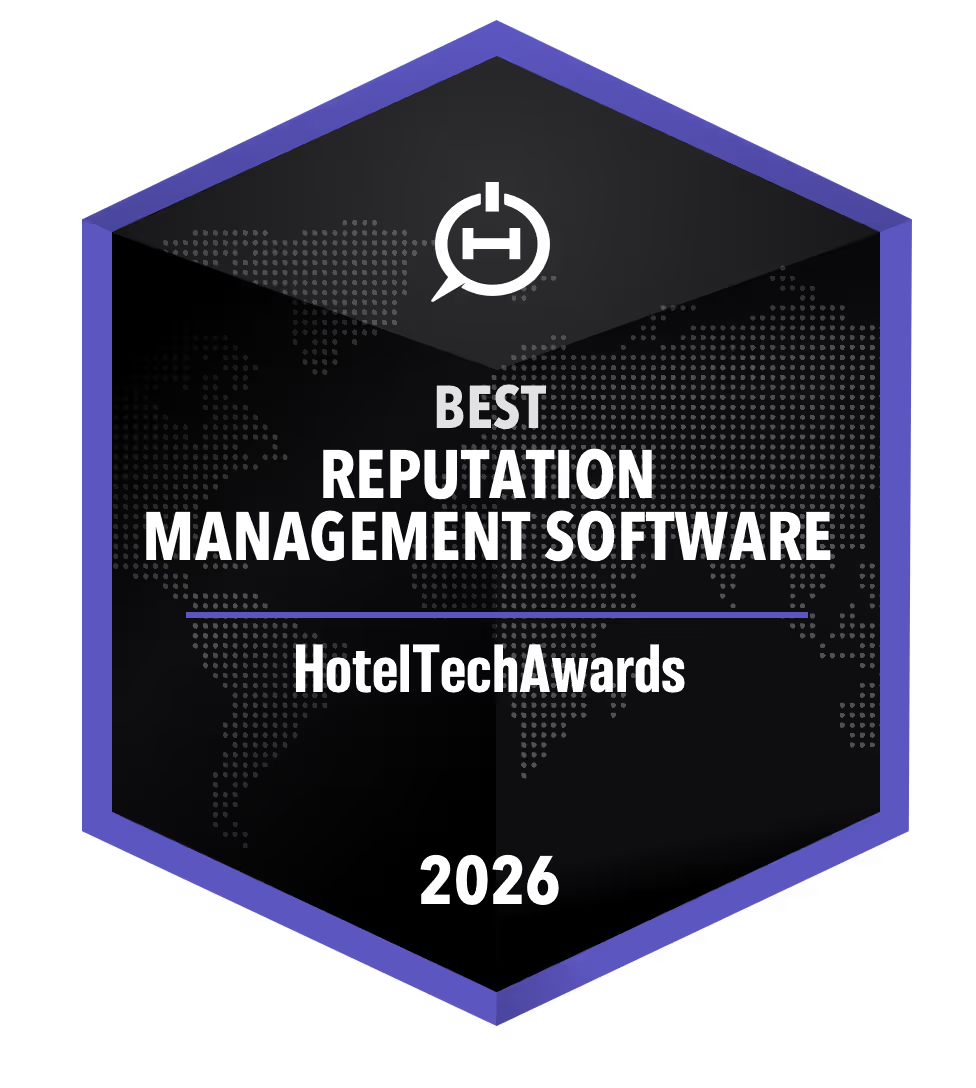I social media sono diventati parte integrante del marketing moderno, soprattutto nel settore alberghiero. Per gli hotel, una presenza efficace sui social media può migliorare significativamente la visibilità, coinvolgere gli ospiti attuali e potenziali e generare prenotazioni. Questo articolo esplora l'impatto dei social media sugli hotel e presenta sette strategie efficaci per sfruttarne il potenziale.
Qual è l'impatto del marketing sui social media sugli hotel?
Il social media marketing è una componente essenziale nel settore alberghiero, con un impatto significativo sulla visibilità e sulla reputazione del brand degli hotel. Sfruttando diverse strategie sui social media, gli hotel possono interagire direttamente con un pubblico eterogeneo, creare contenuti visivamente accattivanti e favorire interazioni in tempo reale con gli ospiti. Metriche chiave come tassi di coinvolgimento, traffico di referral e tassi di conversione rappresentano indicatori critici di successo per i professionisti del marketing nel settore alberghiero.
Un esempio lampante dell'impatto del social media marketing sugli hotel è la ristrutturazione del Mondrian Hotel nel 2019. Durante questo progetto, i social media sono stati parte integrante delle fasi di pianificazione ed esecuzione. Aidan Marus, Direttore della Vita Notturna dell'hotel, ha sottolineato fin dall'inizio il ruolo della strategia sui social media. "Le discussioni iniziali si sono concentrate su come nuovi arredi, infissi e design avrebbero influenzato l'interazione sui social media. Ci aspettavamo che il murale di ghiaccioli di Michael sarebbe diventato un'attrazione visiva chiave per gli ospiti che entravano allo Skybar dall'ingresso Sunset", ha osservato Marus. Questo caso illustra come gli albergatori possano sfruttare gli strumenti di social media marketing per orientare le decisioni progettuali e operative, migliorando sia l'attrattiva dell'hotel che l'esperienza complessiva degli ospiti.
Integrando i social media nel proprio approccio di marketing, gli hotel possono utilizzare efficacemente gli strumenti di marketing per amplificare la presenza del proprio brand, interagire con i potenziali ospiti e incrementare le prenotazioni. Questo utilizzo strategico del social media marketing dimostra il suo profondo impatto sul successo e sulla reputazione degli hotel nel competitivo settore dell'ospitalità.
In che modo il marketing sui social media può influenzare le decisioni dei consumatori nella scelta dell'hotel?
Le piattaforme dei social media svolgono un ruolo fondamentale nel plasmare la percezione dei consumatori e influenzare le decisioni relative alla scelta dell'hotel, soprattutto nell'era dei viaggiatori Millennial e della Generazione Z. Con il 55% dei consumatori che mette "Mi piace" alla pagina Facebook di un marchio alberghiero per raccogliere maggiori informazioni sulla struttura, i social media sono essenziali per la scoperta del marchio e migliorarne la visibilità.
I contenuti generati dagli utenti hanno un impatto significativo sui potenziali ospiti: il 76% delle persone condivide le foto delle proprie vacanze su diverse piattaforme di social media. Questa tendenza sottolinea l'importanza di essere "degni di Instagram" e di utilizzare hashtag e tag di posizione popolari per aumentare la visibilità di un hotel. Recensioni positive e contenuti coinvolgenti su piattaforme come TripAdvisor e Google Reviews creano credibilità e fiducia, rappresentando fattori cruciali per i viaggiatori. Inoltre, l'uso efficace di Facebook Ads e piattaforme di marketing può amplificare ulteriormente il passaparola, aumentando la notorietà e le prenotazioni attraverso una migliore presenza sui social media.
Per saperne di più sulle piattaforme di recensioni e annunci online che influenzano la presenza online dei marchi alberghieri, leggi il nostro articolo " Ottimizza i tuoi annunci alberghieri per aumentare le prenotazioni: tutto ciò che devi sapere"
Quali sono le 7 strategie efficaci di social media marketing per gli hotel?
Implementare strategie efficaci di social media marketing è fondamentale per gli hotel per migliorare la propria presenza online e raggiungere potenziali ospiti. Ecco sette strategie chiave che gli albergatori dovrebbero prendere in considerazione:
a. Ottimizzare i profili e i contenuti dei social media per la ricerca
Le statistiche rivelano che le strutture con gallerie fotografiche ben curate registrano circa il 138% in più di coinvolgimento degli utenti e hanno il 225% in più di probabilità di ottenere prenotazioni rispetto a quelle meno attive sui social media. La SEO si estende alle piattaforme social, dove gli hotel dovrebbero utilizzare parole chiave pertinenti, immagini di alta qualità e un branding coerente. Creare descrizioni ben scritte e utilizzare hashtag strategici può aumentare significativamente la visibilità. Ad esempio, l'inserimento di tag di posizione e hashtag specifici per area può attrarre i viaggiatori alla ricerca di alloggi in quella regione.
Per saperne di più su come Google classifica i risultati di ricerca, leggi questo articolo .

b. Sfruttare i contenuti generati dagli utenti e le recensioni online
Un sondaggio di Expedia ha rilevato che il 30% degli americani è influenzato dai social media quando prenota un viaggio. La condivisione di contenuti generati dagli utenti (UGC) e recensioni positive online può aumentare la credibilità di un marchio alberghiero. Incoraggiare gli ospiti a condividere le proprie esperienze e riutilizzare questi contenuti per campagne di marketing può costruire un'immagine di affidabilità. Gli hotel possono anche lanciare campagne che incentivano gli ospiti a pubblicare recensioni o condividere foto, che possono essere pubblicate sulla pagina Facebook dell'hotel, su Instagram e su altre piattaforme di social media.

Scopri come misurare il ROI delle recensioni online nel nostro articolo: Comprendere il ROI delle valutazioni delle recensioni online: metriche, KPI e altro ancora
{{blog-cta-video="/features/product-updates"}}
c. Utilizzare la pubblicità a pagamento sui social media per campagne mirate
La pubblicità a pagamento sui social media, su piattaforme come Facebook e Instagram, consente agli hotel di rivolgersi a specifici gruppi demografici, interessi e comportamenti. Con un tasso di conversione medio di circa il 9% sugli annunci di Facebook e un CPC medio compreso tra 0,26 e 0,97 dollari, gli hotel possono creare annunci che evidenziano offerte speciali, promozioni stagionali o servizi esclusivi. Monitorare le prestazioni degli annunci e adattare il targeting e i contenuti per ottimizzare il ROI è fondamentale. Un budget efficace e una chiara comprensione delle metriche degli annunci sono fondamentali per campagne pubblicitarie di successo che generano prenotazioni.
Google Hotel Ads è una delle piattaforme pubblicitarie digitali più redditizie per il settore alberghiero. Scopri come sfruttare al meglio la pubblicità a pagamento sulle piattaforme Google nel nostro articolo " Google Hotel Ads: la guida definitiva per gli albergatori esperti"

d. Interagisci con influencer e brand ambassador
L'influencer marketing può amplificare la portata e l'autenticità di un hotel, con tassi di conversione per tali campagne che vanno dall'1 % al 5% . Collaborare con influencer del settore viaggi e brand ambassador in linea con il pubblico target dell'hotel può essere estremamente efficace. Negoziare i termini, definire obiettivi chiari per la campagna e misurarne l'impatto sono passaggi essenziali. Ad esempio, invitare un influencer a soggiornare in hotel e condividere la propria esperienza può generare contenuti video autentici e aumentare la visibilità tra i follower.

Didascalia: Esempio di una campagna di influencer marketing per il settore alberghiero. Fonte: Trova il tuo influencer
e. Implementare campagne di marketing stagionali e basate su eventi
Allineare i contenuti dei social media con le tendenze stagionali e gli eventi locali può aumentare il coinvolgimento e le prenotazioni fino all'84% . Gli hotel possono creare post sui social media incentrati su festività, festival o attrazioni locali. Ad esempio, promuovere un pacchetto vacanze invernali durante le festività o evidenziare eventi speciali come un festival gastronomico locale può attrarre potenziali ospiti e incoraggiare le prenotazioni. Queste campagne di marketing sfruttano hashtag popolari e tag di posizione per massimizzare la portata.

f. Creare contenuti interattivi e coinvolgenti
Contenuti interattivi, come sondaggi, quiz e sessioni video in diretta, possono aumentare significativamente il coinvolgimento degli utenti fino al 70% . Gli hotel possono utilizzare questi strumenti per raccogliere feedback, intrattenere e informare il proprio pubblico. Alcuni esempi includono tour virtuali della struttura, sessioni di domande e risposte con il personale o sondaggi interattivi sulle preferenze degli ospiti. Questo approccio crea una presenza dinamica sui social media che cattura l'attenzione dei potenziali ospiti e ne incoraggia il coinvolgimento.

Didascalia: Un marchio alberghiero che invita i follower di Facebook a partecipare a un quiz: un modo perfetto per far conoscere ai millennial la storia del loro marchio.
g. Monitorare e analizzare le prestazioni dei social media
Utilizzare strumenti di analisi per monitorare le performance dei social media è essenziale per un miglioramento continuo. Metriche come tassi di coinvolgimento, reach e tassi di conversione forniscono informazioni su cosa funziona e cosa no. Esaminare regolarmente queste metriche e adattare le strategie in base ai dati sulle performance può portare a campagne più efficaci. Strumenti come Facebook Insights, Instagram Analytics e piattaforme di terze parti come Hootsuite offrono dati preziosi per perfezionare le strategie sui social media e ottenere risultati migliori.

Integrando queste strategie, gli hotel possono potenziare i propri sforzi di marketing sui social media, entrare in contatto in modo più efficace con il proprio pubblico di riferimento e ottenere successo nel competitivo settore alberghiero.
Qual è la migliore strategia di social media marketing per gli hotel di lusso?
Gli hotel di lusso dovrebbero implementare una strategia di social media sofisticata che rifletta il loro marchio di lusso e che si rivolga ai viaggiatori più facoltosi. È fondamentale creare contenuti visivamente accattivanti che mettano in mostra i servizi lussuosi dell'hotel, le squisite esperienze culinarie e i panorami mozzafiato. L'utilizzo di contenuti video di alta qualità e tour virtuali su piattaforme come Instagram e Pinterest può catturare e coinvolgere efficacemente un pubblico esigente.

Offerte esclusive ed esperienze personalizzate, valorizzate attraverso una gestione strategica dei social media, accrescono ulteriormente il prestigio dell'hotel. Le collaborazioni con influencer del lusso che condividono in modo autentico post sulle loro esperienze esclusive possono aumentare significativamente la visibilità dell'hotel tra i suoi follower più facoltosi.
Ad esempio, il 7Pines Resort Ibiza utilizza efficacemente Instagram per promuovere i suoi servizi di lusso e le viste mozzafiato, attirando una clientela di alto livello. Sfrutta inoltre Facebook e LinkedIn per promuovere eventi esclusivi, mantenendo una solida presenza sui social media su più piattaforme. Questo approccio multipiattaforma garantisce al brand di entrare in contatto con potenziali ospiti attraverso diversi canali, migliorando la sua strategia di marketing complessiva.
Qual è la migliore strategia sui social media per gli hotel indipendenti?
Gli hotel indipendenti dovrebbero adottare una strategia di social media conveniente che evidenzi le loro caratteristiche uniche e promuova il coinvolgimento locale. Enfatizzare l'arredamento distintivo dell'hotel, il servizio personalizzato o il suo significato storico può distinguerlo dalle grandi catene. Gli strumenti di gestione dei social media possono contribuire a semplificare queste attività e ottimizzare il coinvolgimento.
Sfruttare le partnership locali e promuovere le attrazioni locali attraverso post sui social media può creare opportunità promozionali reciprocamente vantaggiose. Coinvolgere la comunità locale condividendo post sugli eventi locali, sulla storia dell'hotel e sulle attrazioni vicine aiuta a creare una narrazione avvincente che risuona con gli ospiti in cerca di esperienze autentiche.
Organizzare concorsi e giveaway su piattaforme come Twitter e Pinterest può aumentare il coinvolgimento e ampliare la portata dell'hotel. Ad esempio, organizzare un concorso sui social media in cui gli ospiti twittano i loro luoghi o esperienze locali preferiti genera contenuti generati dagli utenti e aumenta la visibilità. Questo approccio personalizzato e incentrato sulla community aiuta gli hotel indipendenti a costruire una base di clienti fedeli e a distinguersi in un mercato competitivo.
Migliora la tua strategia sui social media attraverso la gestione della reputazione online basata sull'intelligenza artificiale – MARA
La gestione delle recensioni online è un aspetto fondamentale per una strategia di social media di successo. MARA, il nostro assistente AI per le recensioni , integra perfettamente la gestione della reputazione online con le attività sui social media. Questo strumento intuitivo è progettato per semplificare il processo di gestione della reputazione online, rendendolo più efficiente, personalizzato e veloce. Offre l'intelligenza artificiale migliore e più personalizzata per rispondere e analizzare le recensioni dei tuoi ospiti.
Review Inbox basata sull'intelligenza artificiale
Una delle funzionalità principali di questo strumento è la Review Inbox . Grazie alla tua posta in arrivo, rispondere alle recensioni è semplicissimo: basta cliccare su "Genera risposta" e poi su "Invia". La Review Inbox si collega a diverse fonti di recensioni, tra cui Google, Booking.com e Tripadvisor, offrendoti una panoramica di tutte le tue recensioni. Puoi anche configurare l'automazione delle risposte alle recensioni: perché non consentire MARA di rispondere automaticamente a recensioni semplici, come quelle a 5 stelle di Google senza testo, assicurandoti di non perderne nemmeno una? Le notifiche giornaliere sulle nuove recensioni ti tengono aggiornato e in controllo.

Review Analytics avanzata
Per aiutarti a comprendere e analizzare la moltitudine di recensioni, il Review Assistant integra anche Review Analytics . Questo fornisce informazioni fruibili e di facile comprensione, personalizzate esclusivamente per la tua attività. Con MARA, puoi ottenere rapidamente il succo di tutte le tue recensioni senza doverle leggere una per una. L'analisi è così dettagliata che puoi scoprire problemi specifici come "l'acqua della piscina è troppo fredda" o "mancanza di un'opzione vegana per la colazione". Queste informazioni aiutano a ottimizzare l'esperienza degli ospiti senza che tu debba essere un esperto di dati.

L'intelligenza artificiale più personale
L'intelligenza artificiale di MARA non è solo efficienza, ma anche personalizzazione. La Brand Voice consente all'intelligenza artificiale di adattarsi al tuo tono, assicurandoti che le tue risposte risultino autentiche. Inoltre, con gli Smart Snippets , puoi "insegnare" all'intelligenza artificiale come rispondere a elogi o reclami ricorrenti. L'intelligenza artificiale incorpora quindi queste informazioni nelle sue risposte, ma sempre con parole diverse, fornendo risposte più personalizzate e pertinenti.
Questo assistente per le risposte alle recensioni è rapidamente diventato una svolta per oltre 2000 clienti. La sua promettente capacità di migliorare la valutazione complessiva, amplificare i tassi di risposta, ricavare informazioni dal feedback dei clienti e far risparmiare tempo e denaro è il motivo della sua crescente popolarità.
Gestire le recensioni online non deve essere un compito arduo. Con il software appropriato, non solo puoi semplificare il processo, ma puoi anche personalizzare le tue risposte e ricavare preziose informazioni dalle recensioni. Quindi, perché esitare a provare il nostro Assistente AI per le Recensioni, MARA? È completamente gratuito , non richiede una carta di credito e può essere pienamente operativo in meno di cinque minuti.
Pensiero finale
Una strategia completa di social media marketing è fondamentale per il successo nel settore alberghiero. Gli albergatori devono sfruttare diverse piattaforme social per costruire e migliorare il proprio brand. Ottimizzando i profili social, utilizzando l'influencer marketing e interagendo con gli influencer per raggiungere il pubblico di riferimento, gli hotel possono aumentare significativamente la propria presenza online. L'uso efficace della pubblicità a pagamento su piattaforme come Facebook e LinkedIn amplifica ulteriormente la portata e il coinvolgimento. I professionisti del marketing nel settore alberghiero dovrebbero perfezionare continuamente il proprio approccio in base alle tendenze del settore e alle metriche di performance per garantire un successo duraturo.
{{blog-cta="/features/product-updates"}}
Domande frequenti:
Il marketing sui social media nel settore dell'ospitalità prevede l'utilizzo di piattaforme come Facebook, Instagram e LinkedIn per promuovere gli hotel, interagire con gli ospiti e aumentare le prenotazioni attraverso una serie di attività online.
I social media svolgono un ruolo poliedrico nel marketing alberghiero, aumentando la notorietà del marchio, coinvolgendo i clienti, favorendo la fidelizzazione e mettendo in mostra i servizi e le esperienze dell'hotel.
Una forte presenza sui social media aumenta la visibilità di un hotel, consente un coinvolgimento diretto con ospiti potenziali e attuali e supporta la gestione della reputazione attraverso feedback e recensioni in tempo reale.
I vantaggi includono una migliore percezione del marchio, un aumento delle prenotazioni, una migliore conoscenza dei clienti e la possibilità di realizzare campagne di marketing mirate che raggiungano specifici gruppi demografici e interessi.
La frequenza di pubblicazione dovrebbe bilanciare coerenza e qualità. Le best practice del settore suggeriscono di pubblicare almeno un paio di volte a settimana, con una frequenza personalizzata in base alla piattaforma social e alle dinamiche di coinvolgimento del pubblico.




















-min.avif)
